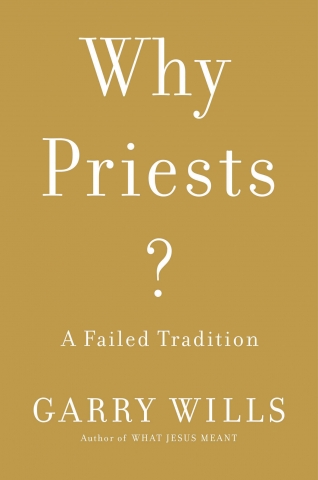Because my computer has shuffled off its mortal coil, run down the curtain and joined the bleedin’ choir invisible, the Atheist round results from the Turing Test will probably run Friday or Saturday, once I’ve got a replacement.
Over at Fare Forward, I’ve taken a crack at reviewing Gary Wills’s book Why Priests? A Failed Tradition and, if you want a very quick glimpse of how I felt about it, here’s how the review kicks off:
The first priest that Garry Wills takes aim at isn’t a man in a clerical collar. It’s Christ.
A significant proportion of the book is spent disputing Jesus’s lineage as a priest in the order of Melchizedek (as laid out in the Letter to the Hebrews), but Wills isn’t trying to strip Jesus of titles. He means to recast Jesus in a role he respects more—not a priest, but a Jewish prophet.
One thing I found particularly interesting while sorting through Wills’s criticisms is how he views the luxury and pomp that surrounds the priest at the Mass. (There’s a good deal less of it when they are, say assisting the dying). I’ve seen the standard defense of the Church’s art and wealth: “Man does not live by bread alone.” The Church should be a place of beauty for the parishioners because we need access to the sublime, just as much as we need shelter. For the Church to neglect either would be to not acknowledge the fullness of what sets us apart as humans.
But Wills’s book forced me to think more about the role that ritual and richly decorated vestments play for the priest as opposed to the laity.
Wills sees the pomp and circumstance of church as drawing our attention away from the God who became Man and directing it towards just one particular man, swathed in robes and standing front stage center. But when an actor puts on costuming and grease- paint, she does it to become someone else, both to the audience and to herself. A director I worked with once told me to start working on a show by getting different shoes, or, failing that, by putting a pebble in mine during rehearsals—anything to set this space off from ordinary life.
A priest doesn’t vest to draw attention to himself, but to what he does. In vestments, priests become a little anonymous. The sacraments work ex opere operato, from the work done, not the merits of the person carrying it out. The ornate robes tell us what work the priest is prepared to do, just as oxygen tanks and helmets mark out firefighters.
To read the rest of the review, click through to Fare Forward.
Update: Father Michael Duffy reflects on his experience vesting for his first Mass in response to the review.













